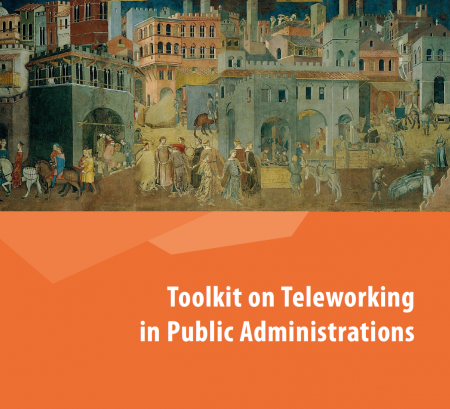ACTIONS
- Protect and safeguard cultural and natural heritage
- Learning and educational opportunities
- Cultural participation/social inclusion
- Sustainable tourism
- Support research
- Employment (recruiting, training, safety)
- Energy consumption, greenhouse gas emissions
- Waste management and reduction
- Transport (forms of, energy use)
- Commercial activities including copyright and IP
- Governance and management
- Security, disaster preparedness, risk reduction
- External partnerships and collaborations
- Toolkit/framework/roadmap
Toolkit on Teleworking in Public Administrations

Intended Audience
“The Toolkit can be used by all levels of public aministrations and is designed to support human resources (HR) managers, senior management, line managers and trade unions in designing and rolling out teleworking for their employees.”
- Centre of Expertise for Good Governance, Council of Europe
“The main objective of the Toolkit is to explore, in a very practical way, how public authorities at all levels of government can implement teleworking arrangements for civil servants, given both the particular challenges faced by public sector entities and the growing financial, human resources and political incentives to allow at least a portion of public employees to work remotely.
The Toolkit is designed to facilitate decision making on the different aspects of teleworking within public administrations and create a clear roadmap as to what needs to be considered and what steps have to be taken, all steeped in research and international good practice.” (p.7)
Avaiable in
- English
SDGs LINKAGES
The resource is closely linked to SDG targets relating to legal compliance and employee rights.
These include, in particular, SDGS 3.4 (mental health and wellbeing), 8.8 (protect labour rights and provide safe and secure working environments for all employees), SDG 5.B (increase use of information and communications technology among women), 8.5 (productive employment and decent work for everyone), 10.3 (eliminate discriminatory policies and practices), 10.4 (social protection policies), protecting fundamental freedoms, which includes the right to rest and leisure (SDG 16.10), and supporting laws and policies for sustainable development (SDG 16.B).
Click on the SDG Target to discover Our Collections Matter indicators
-
Our Collections Matter indicators:
- Plans, policies and procedures in place for the safe use of collections, notably in relation to chemical, physical, biological and other forms of hazard.
- Proportion of users of collections facilities reporting positive well-being during and as a result of activities relating to collections.
- Number and proportion of programmes relating to collections that incorporate wellbeing considerations and perspectives.
- Number of targeted programmes drawing on collections that address issues relating to non-communicable diseases, supporting prevention and treatment.
-
Our Collections Matter indicators:
- Number of programmes that support ICT skills, notably for girls and women.
-
Our Collections Matter indicators:
- Increase in number of people in full and productive employment relating to collections, through job creation and recruitment.
- Increase in proportion of existing staff working with collections in productive employment.
- Increase in number of men, women, young people and persons with disabilities in development and training programmes drawing on collections that support them in employment.
- Removal of pay disparities by gender and/or other status for those working with collections.
- Policies and plans in place to ensure that all suppliers and others in the supply chain are in decent and productive work.
-
Our Collections Matter indicators:
- Number and proportions of staff working with collections in safe and secure working environments.
- Number of accidents and other health and safety incidents reported.
- Training and support provided for staff to ensure their wellbeing, health and safety.
- Education, awareness-raising and partnership programmes drawing on collections that address labour rights, notably those of migrant workers and others in precarious employment.
- Reduction of numbers and proportions of staff on short-term or zero-hours contracts.
- Fair pay policies and procedures in place to prevent exploitation.
- Procurement policies that ensure that collecting institutions make use of people who are in decent employment, and that avoid exploitation throughout the supply chain.
-
Our Collections Matter indicators:
- Identification of discriminatory policies and practices, with clear plans to address these, to ensure equal opportunity for all and reduce inequalities of outcome.
- Collections development to uphold and promote legislation and anti-discriminatory perspectives, with the aim of reducing inequality within and between countries.
- Education and participatory programmes that promote anti-discriminatory legislation, policies and action, with the aim of reducing inequality within and between countries.
- Research that supports anti-discriminatory legislation, policies and action, with the aim of reducing inequality within and between countries.
- Participation in partnerships that promote anti-discriminatory legislation, policies and action, with the aim of reducing inequality within and between countries.
-
Our Collections Matter indicators:
- Number and proportion of policies that proactively address equality issues relating to fiscal, wage and social protection considerations.
-
Our Collections Matter indicators:
- Adopt and implement constitutional, statutory and/or policy guarantees for public access to information.
- Plans in place, and plans implemented to enhance public access to information relating to collections.
- Plans in place, and plans implemented to support fundamental freedoms, in line with human rights, national and international agreements and legislation.
- Plans and procedures in place for public access to information relating to the operation and management of collections-based institutions.
- Complaint mechanism in place for public to use where public access to information and fundamental freedoms not supported or fulfilled.
-
Our Collections Matter indicators:
- Proportion of population [audience/users/non-users] reporting having personally felt discriminated against or harassed in the previous 12 months on the basis of a ground of discrimination prohibited under international human rights law.
- Number and proportion of policies that incorporate sustainable development considerations, in the full sense of recognizing all three of social, economic and environmental considerations.
